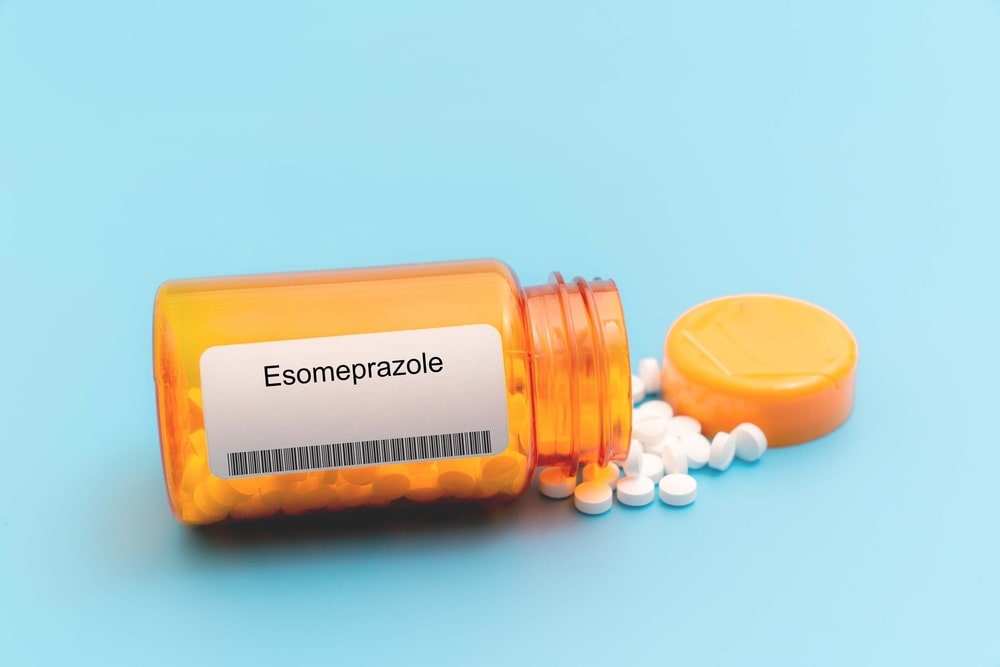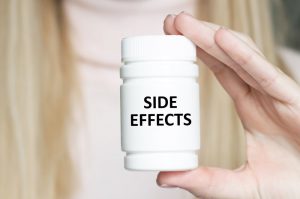What not to take with Nexium?
Certain stomach and esophageal issues (such as acid reflux and ulcers) are treated with Nexium (Esomeprazole). It functions by lessening the acid your stomach produces. It eases symptoms like coughing, heartburn, and difficulty swallowing. This drug aids in the repair of esophageal and stomach ulcers and helps prevent stomach and esophageal cancer.
Esomeprazole is a member of the proton pump inhibitors (PPIs) pharmacological class. To ensure that an over-the-counter product is suitable for you, carefully read the instructions on the packaging. Even if you’ve used the product before, read the ingredients label. It’s possible that the manufacturer changed the ingredients.
That leads us to the question: What not to take with Nexium? But first, we will dive deep into understanding Nexium and its co-related information.
Over-the-counter Nexium is used to treat frequent heartburn (occurring two or more days a week) if you are self-treating with this medicine. These treatments do not immediately relieve heartburn because it could take 1 to 4 days for them to take full action.
Additionally, goods with similar brand names may include various substances with various functions. If you use the product wrongly, What not to take with Nexium, can lead you could get hurt.
What is Nexium used for?
A kind of esomeprazole called Nexium capsules is used to treat diseases like reflux disease and stomach ulcers that are brought on by an excess of stomach acid. It can ease acid reflux. It functions by lessening the stomach’s acid production.
Its Uses:
- Proton pump inhibitors like Nexium lessen the quantity of stomach acid generated.
- The symptoms of gastroesophageal reflux disease (GERD) and other disorders like Zollinger-Ellison syndrome that involve too much stomach acid are treated with Nexium. Additionally, it is utilized to speed up the recovery from erosive esophagitis, which is an esophageal injury brought on by stomach acid.
- Nexium may also be prescribed to treat or prevent stomach ulcers brought on by nonsteroidal anti-inflammatory drug (NSAID) use or Helicobacter pylori (H. pylori) infection.
How does Nexium work?

- Esomeprazole, often known by the brand name Nexium, is an acid-suppressing medication that may be used to treat illnesses including gastroesophageal reflux disease (GERD) and stomach ulcers that are brought on by an excess of stomach acid.
- By permanently impeding the H+/K+ ATPase (often referred to as the gastric proton pump) enzyme, which is responsible for producing stomach acid, Nexium (esomeprazole) lowers the amount of acid produced in the stomach. The parietal cells of the stomach wall house the proton pump. Gastric acid secretion at rest and secretion induced by stimuli are both impacted.
- This enables the esophagus, stomach, and duodenum injured tissue to repair.
- Nexium is a member of the proton pump inhibitors (PPIs) drug class.
- Effective at treating gastroesophageal reflux disease, popularly known as heartburn, and healing erosive esophagitis, a severe inflammation of the lining of the esophagus—the tube that transports food from the mouth to the stomach.
- To lower the risk of NSAID-associated stomach ulcers in persons receiving chronic NSAID therapy, may be administered along with NSAIDs.
- Usually typically lasts for 4 to 8 weeks, while individuals who require more time for healing may receive a second course. Possible long-term use in patients with specific diseases.
- When taking Nexium, individuals with renal problems do not require dosage adjustments. But one should be aware of what not to take with Nexium.
- Both delayed-release granules and delayed-release capsules are available orally.
- When oral Nexium is not feasible or acceptable, there is also an IV preparation available for the short-term therapy of GERD with erosive esophagitis in adults and pediatric patients aged 1 month to 17 years.
What are the side effects of Nexium?

- Nausea
- Stomach pain
- Flatulence
- Sleepiness
- Dry mouth
- Diarrhea or constipation
- Nexium may make some people feel sleepy and impair their ability to drive.
- May conceal the signs of stomach cancer.
- PPIs (including Nexium) have been linked to a higher risk of osteoporosis-related hip, wrist, or spine fractures.
- Magnesium insufficiency and lupus erythematosus, as well as fundic gland polyps.
- Long-term therapy (more than 24 to 36 months) may result in a vitamin B12 deficiency. Women, those under 30, and those taking higher doses are at higher risk. This falls under the category: what not to take with Nexium.
- Administration of PPIs, including Nexium, has been linked to acute interstitial nephritis, a serious kidney inflammation.
Nexium cost:
To lower the cost of Nexium, one can buy Nexium online. Also, check for Nexium generic availability i.e. Esomeprazole.
The Pros for going online on E-pharmacies like MedsEngage Pharmacy are that:
- Convenience: Online pharmacies offer the convenience of ordering medications from anywhere, at any time, without the need to visit a physical store or wait in line.
- Access to a wide range of products: Online pharmacies like MedsEngage Pharmacy often have a broader selection of medications compared to local pharmacies.
- Privacy and discretion: Some individuals may prefer to purchase certain medications discreetly, and online pharmacies provide a level of privacy in these cases.
- Potential cost savings: Online pharmacies may offer competitive prices and discounts, allowing you to save money on your medication purchases.
Other Best Practices to Buy Nexium Online:
- Choose reputable online pharmacies: Stick to well-established online pharmacies that are licensed, accredited, and follow regulatory guidelines. Look for verification seals and certifications on their website.
- Verify the legitimacy: Ensure that the online pharmacy requires a valid prescription for prescription medications.
- Research the pharmacy: Before making a purchase, research the online pharmacy by checking customer reviews, verifying their contact information, and confirming their address and phone number.
Check MedsEngage Pharmacy for the best offers on Nexium medicine.
What not to take with Nexium?

When it comes to managing acid reflux, heartburn, and other related conditions, Nexium (esomeprazole) is a commonly prescribed medication. Nexium belongs to a class of drugs known as proton pump inhibitors (PPIs), which work by reducing the production of stomach acid.
While Nexium is generally safe and effective, it’s important to be aware of certain substances and medications that may interact negatively with it. Hence, one can be made sure of what not to take with Nexium.
We will explore what not to take with Nexium to ensure your well-being and maximize the effectiveness of your treatment.
Antacids:
Antacids are over-the-counter medications used to relieve heartburn, indigestion, and acid reflux symptoms. While they can be effective on their own, combining antacids with Nexium may interfere with the absorption of Nexium in your body.
If you need immediate relief from heartburn while taking Nexium, consult your healthcare provider for alternative strategies or medications that are compatible with PPIs, making one’s mind clear on what not to take with Nexium.
St. John’s Wort:
St. John’s Wort is an herbal supplement commonly used to treat mild depression and anxiety. However, it can induce certain enzymes in your body that can reduce the effectiveness of Nexium. This may lead to inadequate control of your acid reflux symptoms.
If you’re currently taking St. John’s Wort or considering it, inform your healthcare provider to explore alternative options or adjust your medication regimen accordingly, as it is not to take with Nexium.
Clopidogrel (Plavix):
Clopidogrel is a medication prescribed to prevent blood clots in individuals at risk of heart-related conditions.
Studies have shown that taking Nexium alongside clopidogrel may decrease the effectiveness of clopidogrel, potentially increasing the risk of cardiovascular events.
It’s essential to discuss this interaction with your healthcare provider, who may suggest an alternative PPI or adjust your treatment plan to ensure your safety.
Certain Antibiotics:
Some antibiotics, such as clarithromycin and Rifampin, can interact with Nexium and affect its metabolism in the body. This can lead to altered levels of Nexium, reducing its efficacy.
If you require antibiotics while taking Nexium, inform your healthcare provider about your current medication regimen to ensure appropriate dosing and explore potential alternatives if necessary. These antibiotics are what not to take with Nexium.
Cilostazol (Pletal):
Cilostazol is a medication prescribed for peripheral arterial disease, a condition that affects blood circulation in the legs. Co-administration of Nexium and Cilostazol can increase the risk of adverse effects associated with Cilostazol, such as bleeding. It is crucial to inform your healthcare provider if you are taking Cilostazol or any other blood-thinning medications when Nexium is prescribed.
EndNote:
While Nexium is a widely prescribed medication for managing acid reflux and related conditions, it’s essential to be aware of potential interactions that can affect its effectiveness or pose risks to your health. We ensure, What not to take with Nexium.
To ensure optimal results from your treatment and avoid potential complications, always communicate openly with your healthcare provider about the medications, supplements, and herbal remedies you are taking.
They can guide you through the best course of action, provide alternatives if needed, and ensure your treatment plan is tailored to your specific needs. Remember, your health is a priority, and informed decisions will help you achieve the best possible outcome.
FAQs:
How long does Nexium take to work?
Within two to three days, you ought to start feeling better. Nexium may not start to operate adequately for up to 4 weeks.
How long does Nexium stay in your system?
Nexium has an effect for up to 24 hours after a single dose.
How long can you take Nexium?
With the exception when specifically instructed to do so by a healthcare expert, do not take Nexium for more than 14 days. A 14-day regimen can be repeated once every four months.
How often can you take Nexium?
The recommended dosage of Nexium is 40 mg twice daily to treat Zollinger-Ellison syndrome, which is characterized by excessive stomach acid due to a growth in the pancreas. Your doctor will determine the appropriate dosage for you and how long you should take the medication. 80 mg twice daily is the maximum dose.
How long after taking Nexium can I drink coffee?
For Nexium, it is recommended to take the medicine before eating anything and after waiting for almost an hour, food can be consumed. But, what not to take with Nexium matters the most. For example, if you are suffering from acidic reflux, avoid taking tea, coffee, and aerated drinks.

